

Trove - Australian web archive. Olympic Games, Sydney 2000 This collection of websites relating to the 2000 Sydney Olympic Games includes official sites, business sites, cultural sites, parody sites and more.
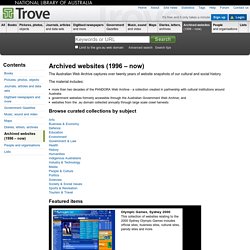
National Library of Australia online exhibitions Explore more than 20 years of exhibitions presented online by the National Library. Antipodean SF Australian short speculative and science fiction published online since 1998. Floriade Revisit and enjoy the passing annual themes of Canberras iconic celebration of spring. Australian Prime Ministers A collection of websites for Australian Prime Ministers both in and out of office. Iconic Australian Brands A collection of websites for company brand names we associate with Australia. 'Digital dark age' could leave historians with no records of the 21st century - News - Gadgets and Tech. Technology could mean that our lives are lost to history, according to experts.
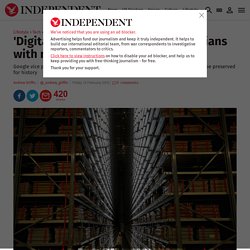
As the way that we store information about ourselves develops, memories stored in files that use older technology are becoming harder to access, Dr Vinton "Vint" Cerf, vice president of Google, has warned. That could mean that historians of the future are unable to learn about our lives, Cerf said. He compared the potential loss to the dark ages — the time after the Romans, about which little is known because there are few written records. Cerf recommended that users make physical copies of important documents, so that they will last into the future.
Avoiding a Digital Dark Age. Data longevity depends on both the storage medium and the ability to decipher the information Kurt D.
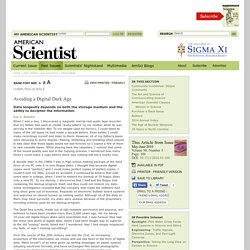
Bollacker When I was a boy, I discovered a magnetic reel-to-reel audio tape recorder that my father had used to create “audio letters” to my mother while he was serving in the Vietnam War. To my delight (and his horror), I could listen to many of the old tapes he had made a decade before. Even better, I could make recordings myself and listen to them. A decade later in the 1980s I was in high school making backups of the hard drive of my PC onto 5-¼-inch floppy disks. The Dead Sea scrolls, made out of still-readable parchment and papyrus, are believed to have been created more than 2,000 years ago. Over the course of the 20th century and into the 21st, an increasing proportion of the information we create and use has been in the form of digital data.
Sending... Your email has been sent Enter the words above:Incorrect please try again. Digital Preservation Management Workshops and Tutorial. Digital Curation Bibliography: Preservation and Stewardship of Scholarly Works, 2012 Supplement. In a rapidly changing technological environment, the difficult task of ensuring long-term access to digital information is increasingly important.
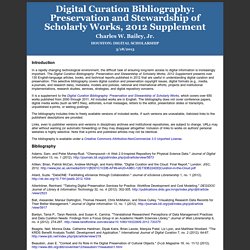
The Digital Curation Bibliography: Preservation and Stewardship of Scholarly Works, 2012 Supplement presents over 130 English-language articles, books, and technical reports published in 2012 that are useful in understanding digital curation and preservation. This selective bibliography covers digital curation and preservation copyright issues, digital formats (e.g., media, e-journals, and research data), metadata, models and policies, national and international efforts, projects and institutional implementations, research studies, services, strategies, and digital repository concerns. It is a supplement to the Digital Curation Bibliography: Preservation and Stewardship of Scholarly Works, which covers over 650 works published from 2000 through 2011.
All included works are in English. Adams, Sam, and Peter Murray-Rust. Never trust a corporation to do a library’s job – The Message – Medium. When this launched, there were dozens of confused comments from people wondering what old videogames has to do with Internet history.

In my mind, this stems from mistaken perception issues of the Internet Archive as solely an institution saving webpages. But their mission and motto is much broader: Universal access to all knowledge. The Internet Archive is not Google. The Internet Archive is a chaotic, beautiful mess. But this software emulation project feels, to me, like the kind of thing Google would have tried in 2003. This effort is the perfect articulation of what makes the Internet Archive great — with repercussions for the future we won’t fully appreciate for years. But here’s a glimpse: last week, one of the JSMESS developers managed to get Netscape running on Windows 3.1 with functional networking. It’s not just about games — that’s just the hook. Your digital life after death – Medium. “What happens to your digital presence after you die?”
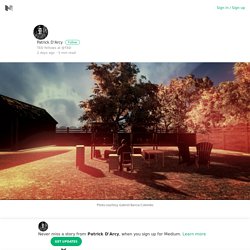
Only a short while ago, no one had to consider what would become of the long trail of personal data we leave all over the internet. Now, artist and TED Fellow Gabriel Barcia-Colombo (TED Talk: Capturing memories in video art) is using this data as raw material to generate high-tech memorials that bring back to life those we’ve lost — and spark a conversation about our virtual lives and death. With a grant from Art and Technology Lab at the Los Angeles County Museum of Art (LACMA), and working with what he calls “an artistic X-Men,” Barcia-Colombo created the Hereafter Institute, a fictional, futuristic funeral home that offers clients consultations for various high-tech options for leaving a digital legacy — from video lockets to vinyl pressings to data-driven custom funerals.
Take a peek at what’s on offer. A very vinyl memorial. Because who needs a stone monument? What about meeting loved ones face to face? INF443 Digital Preservation (8) Born Digital. Managing your digital records. Most of us have moved into the digital world in order to work, communicate, take photos, and generally to run our lives.
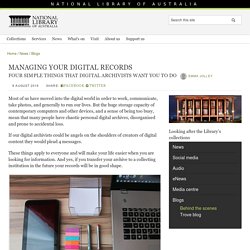
But the huge storage capacity of contemporary computers and other devices, and a sense of being too busy, mean that many people have chaotic personal digital archives, disorganised and prone to accidental loss. If our digital archivists could be angels on the shoulders of creators of digital content they would plead 4 messages.
These things apply to everyone and will make your life easier when you are looking for information. And yes, if you transfer your archive to a collecting institution in the future your records will be in good shape. Home office 1. This is the simplest step. Be descriptive, but……keep it short. Ask yourself: In 50 years will I understand what the item is by the title—will I be able to find it? 2. Control baby! If there is one thing to fill an archivist’s heart with dread it is a pile of loose papers—what are they about? 3. 4. The Internet Archive Turns 20: A Behind The Scenes Look At Archiving The Web.
Internet Archive founder Brewster Kahle and some of the Archive’s servers in 2006.
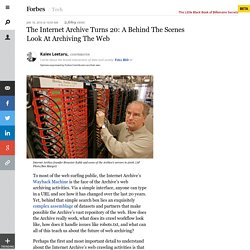
(AP Photo/Ben Margot) To most of the web surfing public, the Internet Archive’s Wayback Machine is the face of the Archive’s web archiving activities. Via a simple interface, anyone can type in a URL and see how it has changed over the last 20 years. Yet, behind that simple search box lies an exquisitely complex assemblage of datasets and partners that make possible the Archive’s vast repository of the web. How does the Archive really work, what does its crawl workflow look like, how does it handle issues like robots.txt, and what can all of this teach us about the future of web archiving?
Perhaps the first and most important detail to understand about the Internet Archive’s web crawling activities is that it operates far more like a traditional library archive than a modern commercial search engine. There are likely many reasons for this architectural decision. I Still Use Plain Text for Everything, and I Love It. Optical Data Storage Squeezes 360TB on to a Quartz Disc—Forever. Digital preservation. In library and archival science, digital preservation is a formal endeavor to ensure that digital information of continuing value remains accessible and usable.[1] It involves planning, resource allocation, and application of preservation methods and technologies,[2] and it combines policies, strategies and actions to ensure access to reformatted and "born-digital" content, regardless of the challenges of media failure and technological change.
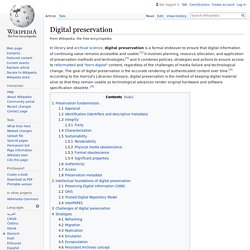
The goal of digital preservation is the accurate rendering of authenticated content over time.[3] According to the Harrod's Librarian Glossary, digital preservation is the method of keeping digital material alive so that they remain usable as technological advances render original hardware and software specification obsolete. [4] Preservation fundamentals[edit] Appraisal[edit]